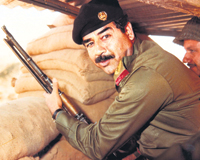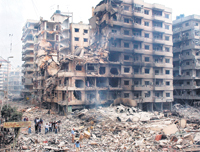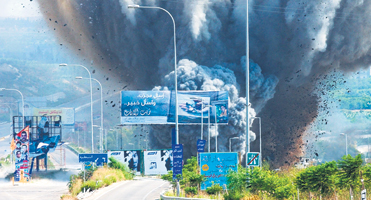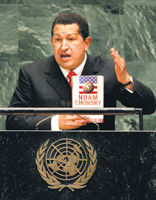
|
Save the goat, slay the son As we launched out on this annual Third World perspective of the issues, the policies, the events and the inner structures that shaped and defined, made or marred, 2006, the big story was that former Iraqi president Saddam Hussein was executed as his oil-rich country was literally being burnt alive in the bush fires of one of the bloodiest misadventures in the history of the United States. As the world today celebrates Haj, the feast of the great sacrifice, it seems that the demigods of the Babylon-like empire are overturning or rewriting the holy scriptures to command that the goat be saved and the son slayed.
The report that Saddam Hussein had been executed came in the aftermath of another 9/11- the number of US troops killed in Iraq roaring above the number killed when al-Qaeda-hijacked planes rammed into New York's Twin Towers and the Pentagon in Washington. By yesterday, the number of US troops killed in the Iraqi war topped 2996 - more than the number killed in the 9/11 attacks -- 2973. Saddam Hussein was hanged yesterday but, his main prosecutors or persecutors — US President George W. Bush and British Prime Minister Tony Blair — have already been hanged by their own people and by the power of international public opinion. If the former Iraqi dictator was executed for crimes against humanity, the question that arises is how many times should the prosecutors of war for oil or profit at the cost of hundreds of thousands of innocent lives in Iraq and elsewhere be hanged.
Wednesday's TV pictures of the Terminator and Republican strongman Governor Arnold Schwarzenegger in crutches perhaps symbolized the crippled state of President Bush and his policies six years after he installed himself as the all-powerful emperor of the biggest and most devastating empire in human history. Now the emperor finds himself without clothes with November's mid-term elections giving Mr. Bush a 'thumpin' defeat as he himself described it, giving the opposition democrats control of both the Senate and the House of Representative. In the immediate aftermath of the election calamity, President Bush fired his hawkish and arrogant defence secretary Donald Rumsfeld who had been identified as one of the architects of the Iraq invasion. As the victorious Democrats mounted pressure on Mr. Bush for a drastic change of course in Iraq, a bipartisan study group threw a thunderbolt at the besieged President. The Iraq Study Group headed by former Secretary of State James Baker and former Democratic Congressional leader Lee Hamilton said that US policy in Iraq had gone drastically wrong and called for a withdrawal of US troops by early 2008. The study group report received wide bipartisan support and President Bush initially gave it a cautious response. But by the year's end, he appears to have decided to aggressively defend his policy and send up to 20,000 more troops to Iraq. While President Bush works out his strategy with one eye on history and other on the Republican Party's prospects at the 2008 presidential election, the Iraq he pledged to save has been turned into a hellhole with some 600,000 people reportedly having been killed since the March 2003 invasion. The horror of horrors is that about 100 people are being killed every day because of the policies of President Bush who is still seen by some fundamentalist American evangelists as the new messiah sent by God to save the world from terrorism. It is this same fundamentalist lobby, according to former US President Jimmy Carter, that is blocking a just solution to the crisis in West Asia. Across the Atlantic, Mr. Bush's principal ally - often dubbed his poodle - is like a king without a crown or just a ceremonial head like his queen. British Prime Minister Tony Blair, who a decade ago soared to greater heights than any previous British leader and had virtually a two thirds majority in the House of Commons, announced recently that he would step down next year and make way for his powerful Chancellor of Exchequer Gordon Brown. After the calamity in Iraq, Mr. Blair had been under heavy pressure to quit but he held his ground until his own party virtually forced him to step down before he causes further disaster for the Labour party at the next election.
Amidst the darkness and despair in Iraq and Afghanistan, Iran and Lebanon, North Korea and elsewhere, the ray of hope for a better world or a just and fair society seems to be coming from the very backyard of the Bush empire. Like a modern John the Baptist and his voice in the wilderness, Venezuela's charismatic President Hugo Chavez appears to be leading an operation miracle for a turnaround from the evil and selfishness, greed and exploitation of the globalised capitalist market economy world. Thinkers such as Arundhati Roy have often pointed out that the world today has a fifth major religion in addition to Christianity, Islam, Buddhism and Hinduism. This fifth major religion is the market and hundreds of millions of people are, knowingly or unknowingly, worshipping its values of self-interest, greed and exploitation. The gods or golden calves of this market religion are figures such as George Bush and, horrifyingly, fundamentalist preachers in America are now often talking of the end times because their messiah Bush is caught up in the mud-hole he created for himself in the self-made Babylon. The new Third World movement, with its increasingly powerful voice, includes Brazil, Nicaragua, Bolivia, Chili, Ecuador and Cuba though the absence of Cuban President Fidel Castro due to serious illness is causing some concern or uncertainty. In a strategic, if not strange, turn of events, President Chavez and his Third World movement in challenging the Bush empire have reached out halfway across the world to countries like Iran. As the year ends, the UN Security Council - coaxed and cajoled by the United States - has imposed sanctions on Iran. But a defiant President Mahmoud Ahmadinejad has vowed his country would go ahead with its uranium enrichment programme to achieve nuclear status on its own.
With President Bush facing a political and military calamity in Iraq, and the focus being very much on the 2008 presidential election, most analysts believe the US has little or no viable military option in Iran. Thus the US might be forced to wait and see how Iran goes ahead with its nuclear programme and then politically or diplomatically deal with any untoward situations as they arise. Running parallel is the crisis or flashpoint in Lebanon. The war there in July-August this year was a turning point in modern world history. After the creation of Israel in 1948, the Israeli war machine, grew to a level where it was thought or feared to be invincible. In the 1967 war, and the 1973 war, Israel smashed up and trounced several Arab armies. But this time, the Hezbollah movement in Lebanon challenged Israel to a 34-day war which ended in a draw if not a defeat for the Israelis. As usual, this war also caused immense human suffering for hundreds of thousands of Lebanese civilians, and tens of thousands of foreign workers were also forced to leave their jobs and flee. Hezbollah leader Sheikh Hassan Nasrallah emerged as a hero among the people and as the year drew to a close he openly challenged the western-backed Fuard Siniaro government. The significance of the 34-day war between Israel and the Hezbollah movement was that it brought out a vital fact of life and history. In most institutional armies, the troops are there mostly for a job and to earn a living. They fight to survive or live but in movements like Hezbollah, the fighters are fighting for a cause with the courage of their conviction and essentially they are always ready to die. That is probably why a few thousand Hezbollah fighters could defy and virtually defeat the once mighty Israel which had in earlier decades thrashed several Arab armies at the same time. As usual, Iran and neighbouring Syria are giving political and financial backing to Hezbollah and an explosive situation appears to be developing in a region that has often been portrayed as the scene of the Armageddon or the final conflict. Humiliated Israel -- with its new Prime Minister Ehud Olmert facing pressure and probes on what went wrong in Lebanon -- is also caught up in a potentially disastrous crisis within crisis in occupied Palestine. After Hamas took control of the Palestinian parliament and provoked a virtual civil war with moderate President Mahmoud Abbas, the Palestinian issue has developed conflicts within conflicts and contradictions within contradictions. Most analysts believe that a just and fair solution to the long simmering Palestinian issue is essential for an overall settlement of the conflict in the whole area but the process seems to be caught up in a dead sea. For Asia, the good news was that after 35 years, an Asian was elected as the United Nations Secretary General. In recent years, the UN, and especially the Security Council, have been manipulated by the United States - and South Korea has been identified as one of the closest allies and cheer leaders of the US and its global empire strategies. Thus, Third World observers would have serious questions about the election of Ban ki-moon, former foreign minister South Korea, as UN Secretary General because he may not be able to show the little independence his predecessor Kofi Annan occasionally displayed during his first term and regularly towards the end of his term. Asia's little North Korea also shook and stunned the world in October this year by carrying out its first nuclear test, though questions remain about its intensity and success. Last week, six-nation talks were held again, in a bid to sort out the North Korean nuclear issue but little progress was made -- with the US also having little option in what seems to be a no-win situation for it. The US also raised controversy by signing a nuclear deal with Asia's giant India provoking questions as to why there was such apparent contradiction in US nuclear policy. The year also saw India strengthening its position as a regional and world economic power, with India's Tata even making a bid to buy the world's biggest steel giant. China also grew in strength as an economic powerhouse, and it is hoping to soar and roar to the highest levels with the Olympic Games in 2008. Neighbouring Pakistan, though caught up in a multi-faceted crisis linked to Afghanistan, made a fresh bid to resolve the long-standing Kashmir dispute. President Pervez Musharraf said his country was ready to give up any claims to Hindu-majority areas in the region if India did likewise with regard to Muslim-majority areas. India has given a positive response to the proposal and a settlement of the Kashmir issue might lead to South Asian stability for the region to emerge as an economic power. In July, relations between the two Asian nuclear neighbours suffered when eight explosions ripped through packed commuter trains during rush hour in Mumbai, killing nearly 190 people and injuring more than 700. The end of a year is generally a good time for deep thinking and reflection. What are the root causes of war, violence and conflict? The absence of war is certainly not peace; that is only a dead peace or piece of the graveyard. History shows us that real and lasting peace takes root from justice, fair play and a more equitable distribution of wealth and resources. The manner in which we have been addressing the issues of poverty alleviation or eradication seems to need a paradigm shift. The concepts of charity and the dole, the crumbs from the table or the modern trickle-down theories have obviously not worked -- because the gap has widened to monstrous proportions with more than 80 percent of the world's resources being controlled or manipulated by 15 percent of the population comprising the rich world. As a social scientist once said, to understand poverty, we need to listen to the poor themselves. Poverty, in both rich and poor countries, is much more than a lack of money and material deprivation. Researchers interviewed 60,000 poor people in 47 countries about what relief from poverty meant to them. The unanimous answer was: "Opportunity, empowerment and security". Dignity was a frequently mentioned concept. Dignity has strong claims for consideration by those concerned with society, poverty and health. Empowerment, which is essential for human development, is what the poor need. Powerlessness is a crippling consequence of poverty and leads to social exclusion and inequity. Poverty is closely associated with powerlessness and social exclusion. Our New Year wish and hope is that world and national leaders, policy makers and all the people will help transform society by transforming themselves from grabbers to givers - and to give without expecting anything in return. |
| || Front
Page | News
| Editorial
| Columns
| Sports
| Plus
| Financial
Times | International
| Mirror
| TV
Times | Funday
Times || |
| |
Copyright
2006 Wijeya
Newspapers Ltd.Colombo. Sri Lanka. |



